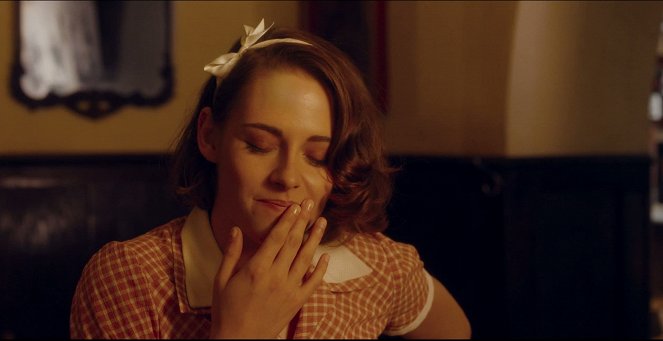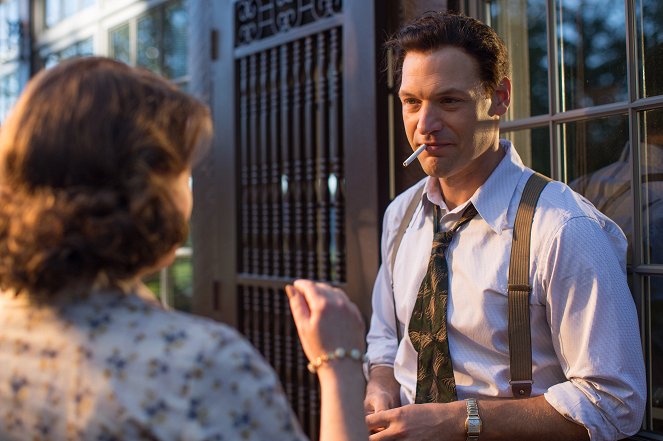Réalisation:
Woody AllenScénario:
Woody AllenPhotographie:
Vittorio StoraroActeurs·trices:
Jesse Eisenberg, Steve Carell, Kristen Stewart, Blake Lively, Sheryl Lee, Paul Schackman, Richard Portnow, Jeannie Berlin, Ken Stott (plus)VOD (4)
Résumés(1)
New York, dans les années 30. Coincé entre des parents conflictuels, un frère gangster et la bijouterie familiale, Bobby Dorfman (Jesse Eisenberg) a le sentiment d'étouffer ! Il décide donc de tenter sa chance à Hollywood où son oncle Phil (Steve Carell), puissant agent de stars, accepte de l'engager comme coursier. À Hollywood, Bobby ne tarde pas à tomber amoureux. Malheureusement, la belle n'est pas libre et il doit se contenter de son amitié. Jusqu'au jour où elle débarque chez lui pour lui annoncer que son petit ami vient de rompre. Soudain, l'horizon s'éclaire pour Bobby et l'amour semble à portée de main... (Mars Distribution)
(plus)Vidéo (2)
Critiques (11)
Ambiance magique de l'âge d'or d'Hollywood et développement d'un schéma amoureux prometteur plus que ce que le film offre au deuxième acte: un amalgame de clichés amoureux et une ligne narrative secondaire inutile avec un frère gangster. Eisenberg et Carell sont formidables, Stewart ne s'intègre pas vraiment et Blake Lively mériterait plus de place, même si le développement de son personnage aurait probablement apporté encore plus de clichés au film. Et le film donne une sensation de durée plus longue que dans la réalité. Fatigué Woody. Deux étoiles et demie.
()
Je pense me répéter constamment quand je commente les films de Woody Allen. En tant que fan absolu, je suis presque toujours aux anges parce que Woody maintient la barre à un niveau élevé depuis déjà plusieurs décennies. L’humour, l’ironie et les thèmes sont toujours là, mais ils se voient chaque fois incorporés dans une nouvelle histoire et interprétés par de nouveaux acteurs. Et puis, moi, la participation actuelle de Kristen Stewart m’enchante beaucoup.
()
“Where's character? Where's loyalty?” The protagonist's father asks the right questions. In Woody Allen’s new film, you won’t find multi-dimensional characters that behave toward each other with any degree of loyalty. You will also search in vain for humour (a few amusing lines merely recycle what we have already heard in Allen’s films, but in funnier versions), compositional motivation for a number of scenes (such as the opening scene with a prostitute), type-appropriate casting (only Steve Carrel with his parted hair is more or less suitable for the 1930s setting), meaningful involvement of an omniscient narrator (is it really necessary to describe absolutely everything, even the beauty of the sunrise that we are just looking at?), any sign that the plot is leading to something (in fact, the story could just go on and on in cycles until the characters get old and die), or any reason that the story is set in the era of classic Hollywood. Well, any reason other than the fact that Woody simply loves this period and until someone builds a time machine, the only way to return to it is through movies. Rather than the need to tell an engaging story and share an original idea, it seems that love for the depicted period and setting was the main (or perhaps even the only) motivation for making Café Society. Thanks to Vittorio Storaro’s cinematography, the film looks beautiful. The abundance of light and a golden hue give the shots a supernatural charm and it is clear that we are in a world where dreams are born. Populate this world with characters who constantly blabber on about famous actors, actresses and directors (and they blabber only not to be quiet – the point and main purpose of the dialogue is simply for us to hear a familiar name), add a jazz soundtrack and you have a film. Actually, no, you don’t, because it is still necessary to at least somehow connect the individual scenes with the most lackluster romance under the sun, even if you really don’t care about the people involved in that romance because they rather prevent you from enjoying the period costumes, architecture and set decorations (based on which the lead roles were written – two self-satisfied characters defined only by the fact that they want to go to the movies and are unable to make independent grown-up decisions). Café Society is such a soul-crushing case of total directorial and screenwriting laxity that if it weren’t for the higher production values and a few well-known actors, I would think that this is the first attempt by a not very good writer who doesn’t understand that telling a story with pictures is not the same as telling a story with words. Looking at it from a more generous angle, it is significantly more likely that Allen’s first series (Crisis in Six Scenes) will be far more entertaining than his (so far) last film. The consolation to be found in that, however, is as comparably worthless as Café Society itself. 40%
()
It's a love triangle, that's all there is to it and the whole thing kind of fizzles out. Woody only makes films out of inertia these days, but Café Society in particular is so caressing, cute, and in its own way, endearingly old-fashioned, especially since it has the flawless atmosphere of 1930s Hollywood, an era that has always appealed to me, an old-timer. In addition to that, I realised that Stewart can be attractive when the role allows her to. And in fact the ending was exactly as melancholic as it should.
()
51st KVIFF – Allen has made a recycled, safe comedy snack. Eisenberg plays a confident and absent-minded young man. Steward city is a mess, so there’s balance in the universe and everything is where it should be. The characters aren’t real people, but one-dimensional figures on the chessboard of Woody’s humour, and everything just fizzles out.
()



Annonces